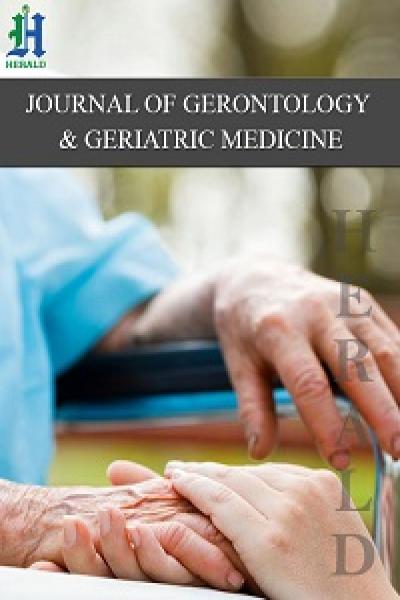
NSAID Induced Othello’s Syndrome
*Corresponding Author(s):
Johansson UweLWL Klinik Dortmund, Gerontopsychiatry, Marsbruchstr.179, 44287 Dortmund, Germany
Tel:+49 23145032864,
Email:uwe.johansson@lwl.org
Abstract
Ibuprofen is a commonly prescribed Non-Steriodal Anti-Inflammatory Drug (NSAID). Gastrointestinal and renal side effects are often-cited adverse reactions of these drugs. There are only few case reports about adverse drug reactions of the central nervous system. In this case report we describe an elderly women with delusional jealousy, better known in literature as Othello’s Syndrome. This Eponym was first mentioned by Todd and Dewhurst in1995. It origins from Shakespeare’s tragedy. The Tragedy of Othello, the Moor of Venice, in wich the jealousy of Othello leads him to commit homicide.
Case Report
Non steroidal anti-inflammatory drugs may cause psychiatric symptoms in some patients [1,2]. This side effect has been recognized for many NSAIDs e.g., ibuprofen. Like other NSAIDs, Ibuprofen inhibits the production of prostaglandins by decreasing the activity of the enzyme cyclooxygenase. Transient psychosis and emergence of a first psychotic episode have been described in the literature [1]. As far as we know there are no reports of Othello’s syndrome due to non-steroidal anti-inflammatory drugs.
We recently encountered a patient with Othello's syndrome developed after short-term treatment with ibuprofen for backache.
Mrs N. a 74-year-old Caucasian presented to our emergency department by her husband with a six week episode of extreme jealousy [3]. She accused her husband of being unfaithful and having an affair with her neighbour. Besides this delusion she was very depressed showed feelings of dejection, hopelessness and, sometimes, suicidal thoughts. On the day of admission she told her husband that she could not longer bear his unfaithfulness and wanted to commit suicide [4].
Mrs N. suffering from rheumatoid arthritis with stiffening of her lower back due to spondylosis. Hence she was prescribed NASID to relieve her pain. During the weeks before admission to our hospital she took Ibuprofen on a daily base with a maximum dose of 3200mg per day. Soon after admission she stopped taking ibuprofen. Within 48 hours, her psychiatric symptoms disappeared completely.
Delusional jealousy is often observed in patients with Parkinson’s disease [5] in this case the patient had an episode of Othello's syndrome due to treatment with NSAIDs. This is a psychological disorder in which a person is preoccupied with the thought that their spouse or sexual partner is being unfaithful without having any real proof, along with socially unacceptable or abnormal behaviour related to these thoughts. The most common cited forms of psychopathology in morbid jealousy are delusions and obsessions. It is considered as a subtype of non-bizarre delusional disorders [6]. The symptoms in this case were closely linked to her exposure of Ibuprofen and vanished soon after this treatment was stopped. There was no suggestion of other etiological factors, such as physical disease or drug or alcohol abuse. The patient’s health was maintained with a low dose of risperidone (0,25 mg per day) and no change in drug treatment.
A review of literature revealed a possible link between prostaglandins and psychotic symptoms. The molecular mechanisms involved in NSAID induced psychiatric alterations remain unclear [7]. Some authors argue whether there is a direct effect on neurons or inhibitory effect on brain cyclooxygenase, prostaglandins, and neurotransmitters [1]. In this case report we are aware of a psychotic exacerbation with correspondence mood disorder after treatment with a non-steroidal anti-inflammatory drug. Health care professionals should be aware that non-steroidal anti-inflammatory drug treatment can be associated with psychiatric symptoms especially in older patients.
References
- Griffith JD, Smith CH, Smith RC (1982) Paranoid psychosis in a patient receiving ibuprofen, a prostaglandin synthesis inhibitor: Case report. J Clin Psychiatry 43: 499-500.
- Gross HA, Dunner DL, Lafleur D, Meltzer HL, Muhlbauer HL, et al. (1977) Prostaglandins. A review of neurophysiology and psychiatric implications. Arch Gen Psychiatry 34: 1189-1196.
- Todd J, Dewhurst K (1955) The Othello syndrome; a study in the psychopathology of sexual jealousy. J Nerv Ment Dis 122: 367-374.
- Bevington D (2023) Othello. Encyclopedia Britannica.
- Kataoka H, Sugie K (2018) Delusional Jealousy (Othello Syndrome) in 67 Patients with Parkinson’s Disease. Front Neurol 9: 129.
- Delgado MG, Bogousslavsky J (2018) De Clérambault Syndrome, Othello Syndrome, Folie à Deux and Variants. Front Neurol Neurosci 42: 44-50.
- Tharumaratnam D, Bashford S, Khan SA (2000) Indomethacin induced psychosis. Postgraduate Medical Journal 76: 736-737.
Citation: Uwe J (2023) NSAID Induced Othello’s Syndrome. J Gerontol Geriatr Med 9: 175.
Copyright: © 2023 Johansson Uwe, et al. This is an open-access article distributed under the terms of the Creative Commons Attribution License, which permits unrestricted use, distribution, and reproduction in any medium, provided the original author and source are credited.

